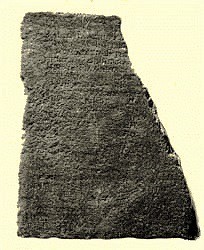Poets are the princes of discourse. They may elide glottal stops at the ends of words, but they do not add them where glottal stops are lacking. They accelerate and defer, they employ mimicry and allegory, they misappropriate [choice phrases] and lend them out, and so too are their metaphors coined and borrowed. They do not drop desinential inflections in the way of everyday speech, nor do they mangle words past correct usage. The claim that poets may go against [any and all] norms of morphology and syntax for the sake of meter is a senseless claim.
Senseless too is the hemistich [no. 164, meter: wāfir]:
A-lam ya’tīka wa-'l-anbā’u tamnī
"Does it not reaches you, when the news comes..."
Although [the metri gratia lengthening of a "weak" verb's jussive-case end vowel may be poetically] admissible, it is nevertheless an error and a flaw. It is as bad as saying [meter: sarī‘]:
Lammā jafā ikhwānuhu muṣ‘aban
"When his brothers scorn a chief..."
viz., "When a chief is scorned by his brothers..."
And [meter: ṭawīl]:
Qifā ‘inda mimmā ta‘rifāni rubū‘u
"Halt, [my two companions,] where among the things recognizable
to you are inhabited sites."
God did not make the poets infallible, nor exempt them from flaws and errors. What is acceptable is what is correct, and everything forbidden by the Arabic language and its principles is to be rejected. When poets wish to say something that does not occur to them in accordance with their poem's meter, they must come up with a substitute fit to take its place without compression or prolixity, and without indulging in vulgar speech or outright error. A poet might say [like Ru’ba ibn al-‘Ajjāj (line 56), meter: rajaz]:
...[happy] as a bee awash in the sweet spittle
to mean "honey." Or a poet might say [like Labīd ibn Rabī‘a (bottom line), meter: kāmil]:
...like the camel-stallion you tarred with a clinging clod
What the poet means is that he tarred the camel with tar, but it was necessary for him to stretch [the meaning to fit the line]. Al-A‘shā does something similar when he says [line 69, meter: basīṭ]:
When your party rides, then horseback riding is what we do.
And if your party comes to a halt, then we are a halting party.
His meaning is: "We ride when you ride, and we halt when you halt," but in order for it to come out right he had to dilate upon it. There is also what [Yazīd ibn al-Ṭathriyya] says [meter: ṭawīl]:
And as long as you dwell in the Najd, [I'll say:] "O Beloved Najd!"
What he means is: "I'll dwell in the Najd as long as you dwell there." But he stretches the idea to bring the verse in line [with demands of rhyme and meter].
My father, Fāris ibn Zakariyā, said: Abū ‘Abd Allāh Muḥammad ibn Sa‘dān, the grammarian of Hamadhan, said: Abū Naṣr al-Bāhilī, the companion of al-Aṣma‘ī, recited [lines 2,3 and 5 of Yazīd's poem] to me thus [meter: ṭawīl]:
I have gratified, for the ladies, with one exception, my erotic longing.
For Dhalfā’ I did not bring it to completion, yet.
To the hill of [our] two encampments, [I say] across the distance:
"Long many you live, O hill!" when thunder lets loose above it.
[And to Dhalfā’:] If you leave the Najd behind, then I'll leave it too,
and everyone who is in it.
And as long as you dwell in the Najd, [I'll say:] "O Beloved Najd!"
The poetic record presents other such cases where poets go wrong. I talk about this in my book of poetry criticism, The Book of the Mighty Blue [Sea] (= Condemnation of Mistakes in Poetry ?).
Last chapter of The Statutes of Language for al-Ṣāḥib ibn 'Abbād
by Abu 'l-Ḥusayn Aḥmad ibn Fāris






